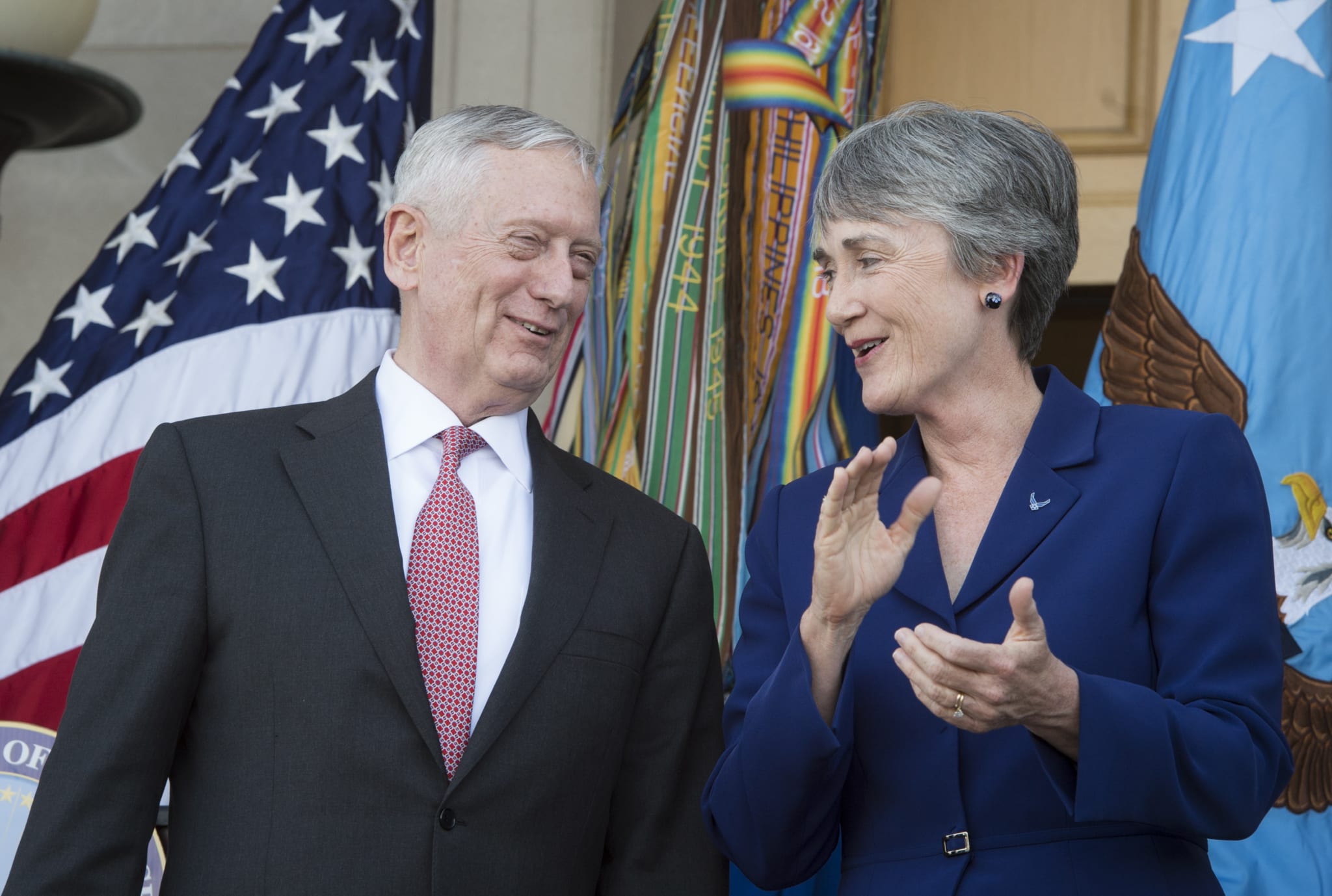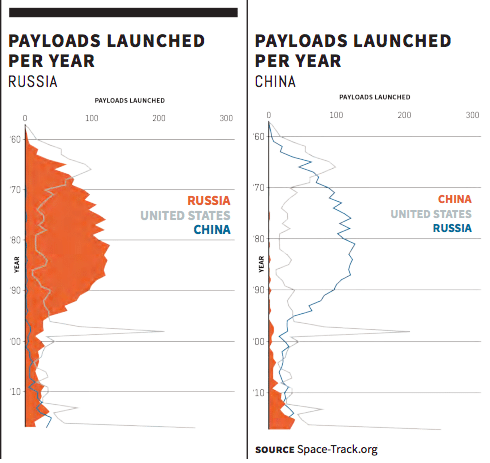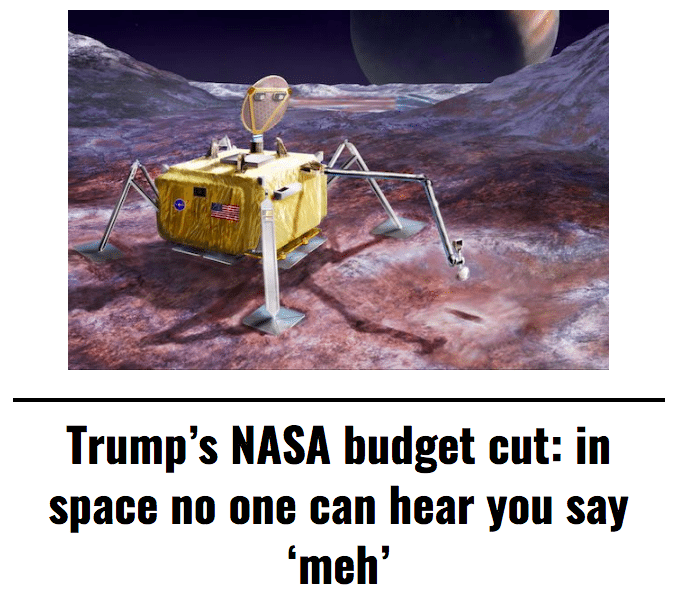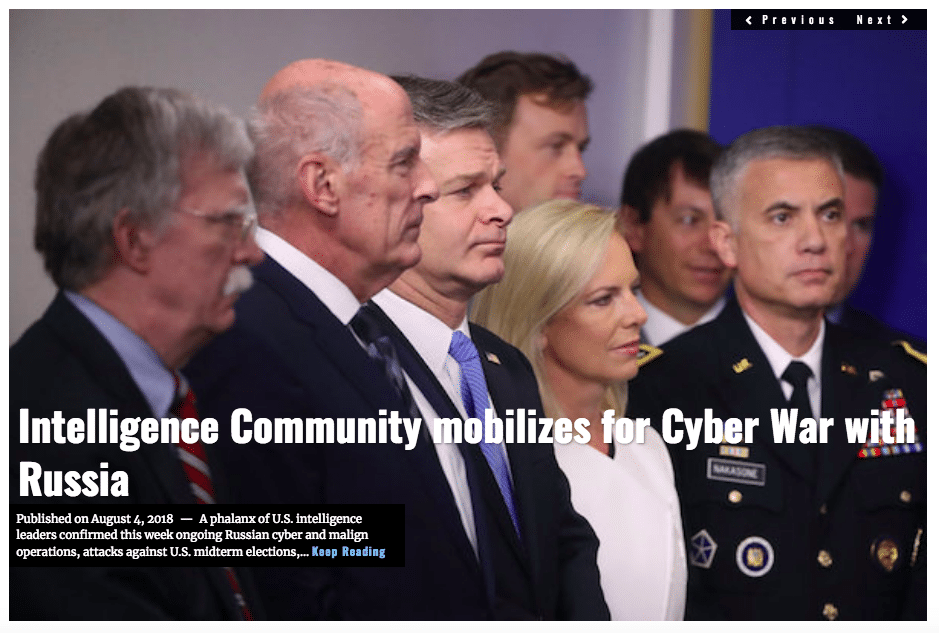The Space Force awakens as the Pentagon moves concept towards reality. DoD announces the bold creation of a Space Development Agency, Space Operations Force and U.S. Space Command. Will Air Force push back?
President Donald Trump surprised many when he directed the U.S. Department of Defense to begin plans for the establishment of an independent Space Force in June 2018. The President suggested that he first coined the term as a joke back in March 2018. Critics of the proposal who downplayed its sincerity aren’t laughing now.
In an announcement at the Pentagon on Thursday, August 9th, Vice President Mike Pence showed how serious the Administration is about revamping the Department of Defense’s space organization. And while Congressional authorization will be necessary to see this effort to completion, there can be no doubt now that some sort of ‘Space Force’ will become a reality.
During his speech, the Vice President unveiled the Pentagon’s detailed plan to start creating a Space Force in a 15-page document titled, “Final Report on Organizational and Management Structure for the National Security Space Components of the Department of Defense.”
Channeling the President’s own words, Pence declared, “‘ It is not enough to merely have an American presence in space; we must have American dominance in space.'” Pence added, “And so we will.”
[Full transcript of Pence speech]
The Department of Defense report laid out four components to create three new organizations that DoD would establish. These included a Space Development Agency to streamline acquisition, a Space Operations Force which will gather “joint space warfighters” to deploy in support of combatant commands, and a Service and Support infrastructure of civilian leadership.
Most critically, DoD will establish a U.S. Space Command, a unified combatant command led by a four star general or flag officer “to lead the use of space assets in warfighting and accelerate integration of space capabilities into other warfighting forces.” The new U.S. Space Command would be responsible “for preparing for and deterring conflict in space and leading U.S. forces in that fight if it should happen.”
In his speech, Vice President Pence observed “the Space Force will not be built from scratch because the men and the women who run and protect our nation’s space programs today are already the best in the world. And since the dawn of the Space Age, America has remained the best in space.”
Yet, it was uncertainty about America’s position in space that led the Administration to separate space forces from the existing military services. There are some within Congress who share these concerns, but currently there is no legislation which authorizes the President to create the force which he desires.
Space is integral to the U.S. way of life, our national security, and modern warfare. Although U.S. space systems have historically maintained a technological advantage over those of potential adversaries, those potential adversaries are now actively developing ways to deny our use of space in a crisis.
– Introduction to DoD Final Report
The Senate and House passed the John S. McCain National Defense Authorization Act (NDAA) for fiscal year 2019 on August 1st, without the necessary language to establish a Space Force. The President is set to sign the NDAA on Monday at a ceremony at Fort Drum.
Verbiage on space matters in the legislation included directing the Air Force to “increase the number and improve the quality of the space cadre” and create an alternate acquisition process for space assets. The only organizational change made was in the establishment of a subunified command structure for space under U.S. Strategic Command, a far cry from an entirely new military service which Trump desires.
This likely wasn’t a slight against the President. As one staffer noted, Trump’s “timing was poor”. When the President made his statement in June, the draft NDAA was well into negotiations and it would have been difficult to add in such a landmark initiative on short notice.
Is Air Force onboard?
The biggest opponent to an independent Space Force, and the potential biggest loser in its creation is the U.S. Air Force. The service owns roughly 90% of the nation’s space assets and is the beneficiary of much of the roughly $10 billon the U.S. spends on space operations. The service staunchly opposed the concept of a space corps last year.
Nevertheless, Trump’s June statement and Pence’s announcement may have compelled the service to reconsider its opposition to a possible Space Force. Todd Harrison, the Director of Aerospace Security at the Center for Strategic and International Studies (CSIS) had observed, a directive from the Commander in Chief will have to carry weight with the service. As he sees it, Trump has “settled the debate” and the service will now fall in line.
Initially, the Air Force said very little in response to President Trump’s June declaration. In a June letter to Air Force personnel, the Secretary of the Air Force Heather Wilson acknowledged the commander in chief’s directive to “begin planning to establish a space force as a new military service” but then also informed her airmen to “not expect any immediate moves or changes”.
However, during a forum at the Washington Post on July 25, 2018, Secretary Wilson seemed more forceful than ever that the Air Force intends to remain the lead agency on space matters. She acknowledged that “the Air Force has most of the Defense Department’s space assets” and was eager to take credit for systems such as communications GPS, boasting that the “blue dot on your phone is provided by the United States Air Force.” Over a third of her time at the forum was spent discussing space issues, yet she never once used the term ‘space force’ or ‘space corps’. The forum appeared to support the Air Force critics who believe the service is not ready to acquiesce.

Douglas Loverro, an independent consultant and former Deputy Assistant Secretary of Defense for Space Policy, told Lima Charlie News back in July, “the Air Force is going to fight this to the death. They’re going to fight it in the press and fight it on Capitol Hill and they’re going to fight it in the Executive Branch.”
Despite Secretary Wilson’s braggadocio, the Air Force, the primary stakeholder in the space enterprise, has been regarded as a poor champion of space missions. During a forum at CSIS earlier this year, Congressman Rogers complained that the service “has used the space budget as a money pot to reach into and pull money out to subsidize the air dominance programs when they feel like Congress is not giving them enough for tankers or fighter jets or whatever, bombers …. that’s caused a lot of the atrophy that we’ve seen in our national security space capabilities.” Lima Charlie News has been unable to contact Air Force spokespersons in the wake of the Vice President’s comments prior to publication.
Loverro believes the problem is not limited to money. The real problem he sees is that it is not focused on developing space professionals within their ranks. “We are losing the race because we don’t have the right people,” he noted. “The Air Force is not growing and developing a corps of individuals who are [specialists in space].”
The Air Force has historically been dominated by pilots and as Loverro pointed out, “it takes a different personnel system to grow a space officer than it does to grow an air officer.” Space officers are contained under the mission support operations career field and, he added, “have the lowest promotion rate of any officer corps in the entire service.”
As to why Trump made his unexpected declaration? That’s not entirely clear. “The trajectory towards a space force was undeniable, the question has always been when,” noted Loverro. As he sees it, Trump may have been experiencing frustration with the disorganized nature of space operations in the DoD. While the Air Force owns much of the space infrastructure, the responsibilities are separated in scores of different agencies, all answering to separate authorities and often not working in coordination.
“He’s looking at all these problems in space and asking who’s in charge? Who should I fire? And the answer has always been ‘we don’t have anyone in charge sir’. If you’re a business leader like he is, you’re thinking ‘let’s put someone in charge on this thing,’” Loverro added.
Is America up to speed in space?
Politics aside, few disagree that the US is losing ground in space. The extent of the danger is hard to fully assess, but Congressman Rogers, who is briefed on classified information admitted in February, “It is bad, the situation we are in as a nation, the vulnerabilities we have to China and Russia … I’d like for the American public to know more. I can’t because, you know, I don’t want to go to jail for leaking classified information. But we’re in a really bad situation.”
The two biggest competitors to US space dominance, Russia and China, have demonstrated surprising capabilities in recent years. China’s rise in the space domain came amid much fanfare when a successful 2007 anti-satellite missile test threw debris into orbit around Earth, endangering numerous other satellites. Subsequent tests, which produced no collateral debris, have attracted far less attention but have demonstrated Beijing’s increased capability in space.
Harrison, who authored a Space Threat Assessment report published by CSIS earlier this year, was quick to point out that missiles are not the only threat to US assets in orbit, noting “but what is actually more difficult to deal with is non-kinetic threats to space systems.” Lasers, jammers and spoofers can confuse and render useless both civil and military space systems. Moreover, these systems are “relatively inexpensive to produce and deploy in large numbers” and thus being widely proliferated. [CSIS Space Threat Assessment 2018]. Russian systems are in use in Ukraine and Syria, with suspected proliferation in North Korea as well.
It is hard to understate how much of a threat these systems pose to the US national security infrastructure. As Secretary Wilson herself stated, “there’s not a mission we do in the military today that does not in some way depend upon space.”
The US’s reliance on space systems became apparent in the first Gulf War in 1991. Effects from space, including GPS navigation, imagery for battlefield analysis and damage assessment and weather forecasts, were essential in creating the dramatic tactical success of Operation Desert Storm. In the years since, the importance of space infrastructure for the Department of Defense has increased substantially.
Today, satellite communications, GPS-guided bombs, ISR video feeds, internet connectivity are all reliant on the space network. And it’s not just the military at risk.

The two largest competitors to the US, China and Russia, have undertaken their own reorganizations of military space organizations in recent years. In 2015, Russia reorganized their space forces under a distinct entity under their Aerospace Forces. In the same year, China established the Strategic Support Force, which is responsible for space and cyber missions.
But Harrison noted that the structure of Chinese and Russian forces isn’t relevant to the US discussion of space. What is important is that Moscow and Beijing have both demonstrated a recognition that “space is a critical domain of modern warfare” while Washington has lagged in this arena. The US maintains dozens of different organizations in the Air Force, the Navy, the Army and the intelligence agencies which, as Harrison noted, “don’t always talk to each other and don’t cooperate very well.” Putting these organizations under a single chain of command could unify US space efforts and allow the US to reassert its dominance.
Nevertheless, significant opposition remains to an independent Space Force. In a statement to Lima Charlie News, Congressman Cooper said, “I have long supported strengthening our position in space. I’m glad President Trump is on board, but we have a long way to go because we need funding and authorization from Congress.” Within Congress, it is members of the Senate who have voiced the greatest concerns about a possible independent space service.
Criticism of the concept usually focuses on the time and money which will be needed to establish a new military bureaucracy. Senator Bill Nelson of Florida had articulated these concerns in a tweet in response to Trump’s June announcement:
“The president told a US general to create a new Space Force as 6th branch of military today, which generals tell me they don’t want. Thankfully the president can’t do it without Congress because now is NOT the time to rip the Air Force apart. Too many important missions at stake.”
The president told a US general to create a new Space Force as 6th branch of military today, which generals tell me they don’t want. Thankfully the president can’t do it without Congress because now is NOT the time to rip the Air Force apart. Too many important missions at stake. https://t.co/uYzqg1W8nE
— Bill Nelson (@SenBillNelson) June 18, 2018
Although the past year has seen intense discussions on the future of US military space operations, the US Department of Defense has wrestled with the appropriate way to organize for space operations for decades. From 1985 to 2002, U.S. Space Command existed as an independent command within the DoD, but its leadership was hamstrung with additional authorities, including serving as the head of the North American Air Defense Command (NORAD).
In 2001, the Rumsfeld Commission recommended that “disparate space activities should promptly be merged, chains of command adjusted, lines of communication opened and policies modified to achieve greater responsibility and accountability.” Adjustments were made in the DoD’s structure but problems remained.
In 2008, the Allard Commission warned that problems still existed in US space national security, noting, “significant improvements in National Security Space (NSS) leadership, management, and organization are imperative to maintain U.S. Space preeminence and avert the loss of the U.S. competitive national security advantage. NSS inadequacies are unacceptable today and are likely to grow, but leadership can reverse this trend.”
Despite these warnings, the Department of Defense did little to further restructure its space infrastructure. It remains to be seen if the most recent discussions about an independent US space defense force will lead to more lasting change.
Loverro, who has advised the Center for Naval Analysis (CNA) on matters of space policy – the group tasked with advising DoD on creating a “Military Department of Space” – has some concerns that new initiatives might meet the same fate as those in the past.
However, he believes the President has made this a legacy issue and will push hard to make it happen.
So when might we see uniformed space officers in the halls of the Pentagon?
Loverro thinks it could be sooner than we expect. “If we were prudent,” he said, “we would think five years.” But if Trump does see this as an important issue and his second term is in doubt, it could be before the end of the president’s first term in January, 2021. After all, politics is an uncertain business and another four years in office is not assured.
Observed Loverro, “sometimes politics prohibits prudence.”
David Max Korzen, Lima Charlie News
[Edited by Anthony A. LoPresti]
David Max Korzen is a writer and expert in national security, foreign policy and the Middle East. A former active-duty U.S. Air Force pilot, Korzen served as a special operations aviation advisor with the 6th Special Operations Squadron, developing the combat capabilities of partner air forces. A veteran of Iraq and Afghanistan, he has worked, lived and studied extensively throughout the Middle East and Central Asia. Korzen holds a master’s degree in Middle Eastern Studies from Harvard University and a bachelor’s degree in International Affairs from George Washington University. His work has appeared in the Los Angeles Times, US News and World Report, the Boston Globe, Real Clear Defense and Arab Studies Quarterly. Korzen was named one of the top 100 veterans of 2017 by Hill Vets, a Washington DC non-profit organization, and is a member of the Defense Council at the Truman National Security Project.
Lima Charlie provides global news, featuring insight & analysis by military veterans and intelligence professionals Worldwide.
For up-to-date news, please follow us on twitter at @LimaCharlieNews
In case you missed it:

![Image U.S. 'Space Force' looking more and more like space reality [Lima Charlie News]](https://limacharlienews.com/wp-content/uploads/2018/08/Space-Force-looking-more-and-more-like-space-reality.png)




![Image GailForce to Space Force: 'Make it so' - the Space Force debate continues [Lima Charlie News]](https://limacharlienews.com/wp-content/uploads/2019/05/Space-Force-01-480x384.png)
![Image Imagine a Global Space Community ... The Space Foundation Can [Lima Charlie News][Graphic by Anthony A. LoPresti]](https://limacharlienews.com/wp-content/uploads/2019/03/Space-Foundation-Space-Symposium-Lima-Charlie-News-480x384.png)

![Israel-Hamas Cyberwar, when old warfare meets new [Lima Charlie News]](https://limacharlienews.com/wp-content/uploads/2019/05/Israel-Hamas-cyber-warfare-01-e1558501438770-480x384.jpg)
![Image Huawei – China’s telecom giant hits a giant wall [Lima Charlie News]](https://limacharlienews.com/wp-content/uploads/2019/01/Huawei-–-China’s-telecom-giant-hits-a-giant-wall-480x384.png)
![Image GailForce: Blinking Red - Cyber War and Malign Influence Operations Today [Lima Charlie News][Graphic: Lima Charlie News]](https://limacharlienews.com/wp-content/uploads/2018/08/GailForce-Blinking-Red-Cyber-War-and-Malign-Influence-Operations-Today-Lima-Charlie-News-01-480x384.png)
![Image #GailForce: U.S. Intelligence community confirms ongoing Russian 'malign influence' operations at Aspen Security Forum [Lima Charlie News]](https://limacharlienews.com/wp-content/uploads/2018/07/GailForce-U.S.-Intelligence-community-confirms-ongoing-Russian-malign-influence-operations-at-Aspen-Security-Forum-480x384.jpg)
![Image GailForce to Space Force: 'Make it so' - the Space Force debate continues [Lima Charlie News]](https://limacharlienews.com/wp-content/uploads/2019/05/Space-Force-01-150x100.png)
![Image Imagine a Global Space Community ... The Space Foundation Can [Lima Charlie News][Graphic by Anthony A. LoPresti]](https://limacharlienews.com/wp-content/uploads/2019/03/Space-Foundation-Space-Symposium-Lima-Charlie-News-150x100.png)